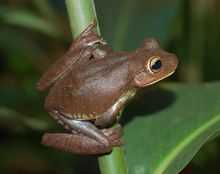Bokermannohyla vulcaniae
| Bokermannohyla vulcaniae | |
|---|---|
 | |
| Conservation status | |
| Scientific classification | |
| Kingdom: | Animalia |
| Phylum: | Chordata |
| Class: | "Amphibia" (wide sense) |
| Order: | Anura |
| Family: | Hylidae |
| Genus: | Bokermannohyla |
| Species: | B. vulcaniae |
| Binomial name | |
| Bokermannohyla vulcaniae (de Vasconcelos & Giaretta, 2005) | |
| Synonyms | |
|
Hyla vulcaniae de Vasconcelos & Giaretta, 2005 | |
Bokermannohyla vulcaniae is a species of frog in the Hylidae family. It is only known from the type locality in Poços de Caldas, Minas Gerais state of Brazil; it is thus endemic to Brazil.[2]
Description
Bokermannohyla vulcaniae is a medium-sized tree frog, about 40–53 mm (1.6–2.1 in) in snout-vent length. It has brown dorsum, becoming paler ventrally. The snout is rounded.[3]
Male Bokermannohyla vulcaniae have anatomical features suggesting that they are able to vocalize, however, the vocal activity of the species is unknown, suggesting that the calling period of males is short.[3]
Conservation status
The species is considered "vulnerable" by IUCN because its known distribution area is restricted and because of habitat loss related to agricultural and mining activities in the area.[1]
References
- ↑ 1.0 1.1 Ariovaldo A. Giaretta (2008). "Bokermannohyla vulcaniae". IUCN Red List of Threatened Species. Version 2013.1. International Union for Conservation of Nature. Retrieved 8 September 2013.
- ↑ Frost, Darrel R. (2013). "Bokermannohyla vulcaniae Vasconcelos and Giaretta, 2005". Amphibian Species of the World 5.6, an Online Reference. American Museum of Natural History. Retrieved 8 September 2013.
- ↑ 3.0 3.1 de Vasconcelos, E. G.; Giaretta, A. A. (2003). "A new species of Hyla (Anura: Hylidae) from southeastern Brazil". Revista Española de Herpetología 17: 21–27.
